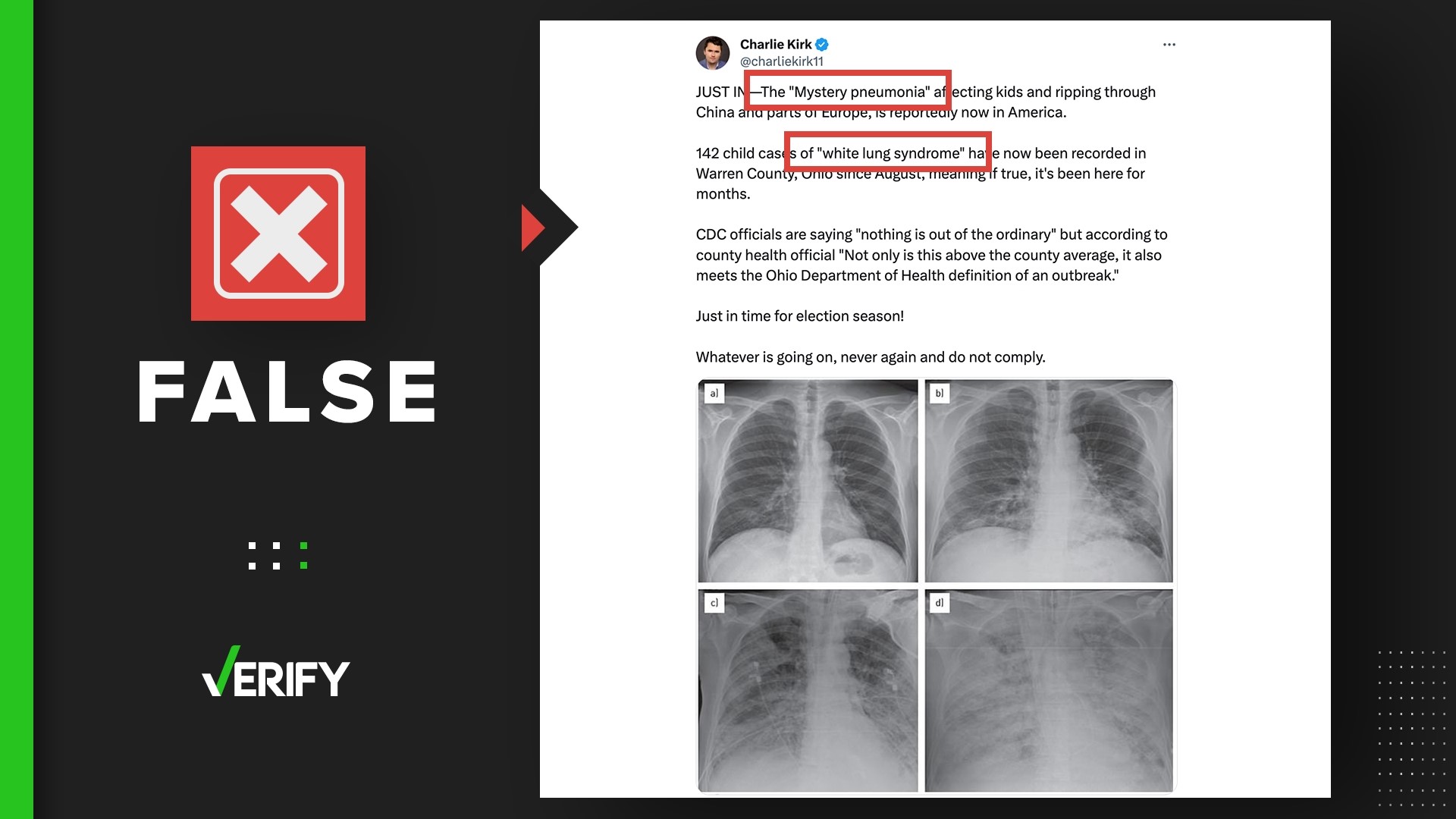Respiratory illnesses such as the flu, RSV and COVID-19 often circulate more frequently during the fall and winter months.
But a viral social media post suggests that a new and unknown respiratory illness called “white lung syndrome” is spreading throughout the world, including in the U.S.
“The ‘mystery pneumonia’ affecting kids and ripping through China and parts of Europe, is reportedly now in America,” conservative activist and radio talk show host Charlie Kirk wrote on X, formerly known as Twitter.
Kirk claimed a county in Ohio has recorded 142 cases of “white lung syndrome” in children since August.
Some news headlines have also linked pediatric pneumonia outbreaks in the U.S. and beyond to “white lung syndrome.”
THE QUESTION
Is there a new illness called “white lung syndrome” spreading in the US?
THE SOURCES
- Warren County Health District in Ohio
- The Centers for Disease Control and Prevention (CDC)
- The World Health Organization (WHO)
- New York State Department of Health
- Shira Doron, M.D., chief infection control officer for Tufts Medicine
- Payal Kohli, M.D., assistant clinical professor of medicine at University of Colorado’s Anschutz Medical Campus
THE ANSWER
No, there isn’t a new illness called “white lung syndrome” spreading in the U.S.
WHAT WE FOUND
Shira Doron, M.D., chief infection control officer for Tufts Medicine, told VERIFY “there is no such thing as ‘white lung syndrome,’” adding that it is a “fake term.”
People are likely using the term because pneumonia shows up on a chest x-ray, which is a black-and-white image, as more whiteness than usual. But it’s not a new or unknown illness, as online posts and headlines suggest.
“Any kind of pneumonia that is viral or bacterial can result in white lungs [on an x-ray],” Payal Kohli, MD., a professor of medicine at the University of Colorado, said.
Bacteria, viruses and fungi can cause pneumonia, which is an infection that inflames the air sacs in one or both lungs.
A county in Ohio and areas throughout China are reporting a recent surge in respiratory illnesses, including pediatric pneumonia. But these outbreaks aren’t connected, health officials say.
Warren County, Ohio, is reporting an “extremely high number” of pediatric pneumonia cases this fall, the county health district said in a statement on Nov. 29. The county has reported 145 cases of pneumonia in children ages 3 to 14 years old since August, which is above the county average and meets the state’s definition of an outbreak.
But the health district did not use the term “white lung syndrome” to describe the outbreak. It also said in the Nov. 29 statement and another issued one day later that the increase in pneumonia cases is not suspected to be a new respiratory virus, “but rather a large uptick in the number of typical pediatric pneumonia cases.”
“There has been zero evidence of this outbreak being connected to other outbreaks, either statewide, nationally or internationally,” the health district said.
A spokesperson for the Centers for Disease Control and Prevention (CDC) also said there is no indication of a link between infections in China and the U.S.
On a national level, the CDC is seeing about the same number and type of pneumonia cases in children and adults that it typically does at this time of year, according to the spokesperson.
China has seen an uptick in outpatient consultations and hospital admissions due to a type of bacteria called mycoplasma pneumoniae since May, according to the World Health Organization (WHO). This bacteria commonly causes “walking pneumonia,” which is a form of the infection that is usually more mild, the New York State Department of Health says.
Chinese health authorities have also attributed a rise in outpatient visits and hospitalizations since October to common winter illnesses such as respiratory syncytial virus (RSV), adenovirus and influenza.
But these are known pathogens, not any new viral or bacterial infections.
“Some of these increases are earlier in the season than historically experienced, but not unexpected given the lifting of COVID-19 restrictions, as similarly experienced in other countries,” the WHO said.
To prevent the spread of respiratory illnesses, health experts recommend that people get vaccines such as the flu shot, wash their hands often, avoid touching their eyes, nose and mouth, wear masks in public places, and avoid crowded places.
The CDC also recommends pneumonia vaccines for some children, people with certain medical conditions and older adults.

